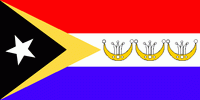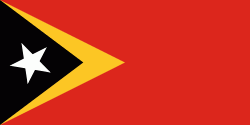Liquiçá District (Liquiçá)
 |
The English language name of the municipality has been said to be a Portuguese approximation of the old name Liku Saen, which means 'python' in the local Tokodede language, or the corresponding portmanteau Likusaen.
Another theory points to the Tokodede expression Likis Aá, meaning 'motion' or 'change', referring to an incident during the founding of the city of Vila de Liquiçá. After the Portuguese had chosen the settlement site, people started clearing the forest there and turning it into an open space. The Portuguese then asked the local people to tell them the name of the area. The local people did not understand the question, and so the Portuguese tried to communicate with gestures by moving their hands back and forth. The local people then responded with the expression Likis Aá, that is, 'moving' or 'changing'.
It has also been asserted that the Portuguese version of the name may also be a "... form of cultural and mind de-colonization ..." [ sic - colonization ] of the local name that changes the indigenous cultural meanings and history.
Map - Liquiçá District (Liquiçá)
Map
Country - East_Timor
 |
 |
| Flag of East Timor | |
East Timor came under Portuguese influence in the sixteenth century, remaining a Portuguese colony until 1975. Internal conflict preceded a unilateral declaration of independence and an Indonesian invasion and annexation. Resistance continued throughout Indonesian rule, and in 1999 a United Nations–sponsored act of self-determination led to Indonesia relinquishing control of the territory. On 20 May 2002, as Timor-Leste, it became the first new sovereign state of the 21st century. That same year, relations with Indonesia were established and normalized, with Indonesia also supporting East Timor's accession into ASEAN.
Currency / Language
| ISO | Currency | Symbol | Significant figures |
|---|---|---|---|
| USD | United States dollar | $ | 2 |
| ISO | Language |
|---|---|
| EN | English language |
| ID | Indonesian language |
| PT | Portuguese language |















